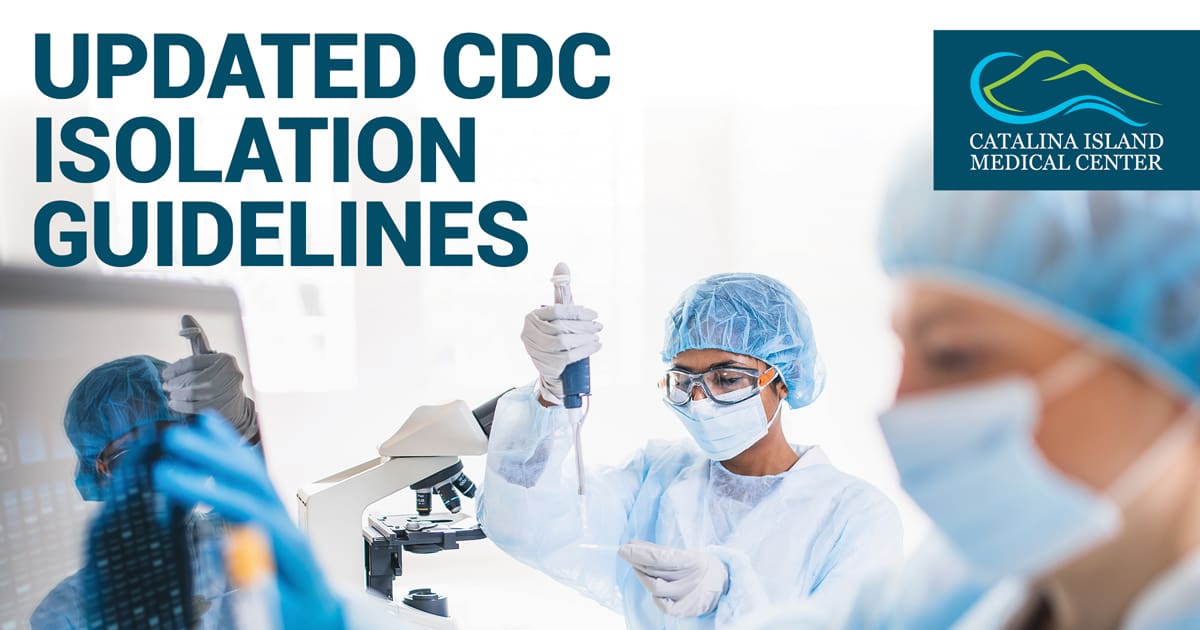Update to CDC Isolation Protocols After COVID-19 Infection
Date Posted: July 20, 2020

Update to CDC Isolation Protocols After COVID-19 Infection
CDC guidelines regarding isolation after COVID-19 infection were recently updated. Here's a summary of what has changed:
- Patients with mild to moderate disease, no longer infectious 10 days after symptom onset provided at least 24 hours without fever. This is a change from the 10 days, 72 hours without fever guidelines previously.
- Patients with severe disease are no longer infectious 20 days after symptom onset.
- PCR test may remain positive for 2+ months even though the patient has not been infectious for a significant amount of time.
- Test based release from isolation precautions is no longer recommended as a result (severely immunocompromised patients would be an exception)
The below text is directly from the CDC website, for full text and continued updates
Read this article on the CDC website
CDC Assessment
Available data indicate that persons with mild to moderate COVID-19 remain infectious no longer than 10 days after symptom onset. Persons with more severe to critical illness or severe immunocompromise likely remain infectious no longer than 20 days after symptom onset. Recovered persons can continue to shed detectable SARS-CoV-2 RNA in upper respiratory specimens for up to 3 months after illness onset, albeit at concentrations considerably lower than during illness, in ranges where replication-competent virus has not been reliably recovered and infectiousness is unlikely. The etiology of this persistently detectable SARS-CoV-2 RNA has yet to be determined. Studies have not found evidence that clinically recovered persons with persistence of viral RNA have transmitted SARS-CoV-2 to others. These findings strengthen the justification for relying on a symptom based, rather than test-based strategy for ending isolation of these patients, so that persons who are by current evidence no longer infectious are not kept unnecessarily isolated and excluded from work or other responsibilities.
Reinfection with SARS-CoV-2 has not yet been definitively confirmed in any recovered persons to date. If, and if so when, persons can be reinfected with SARS-CoV-2 remains unknown and is a subject of investigation. Persons infected with related endemic human betacoronavirus appear to become susceptible again at around 90 days after onset of infection. Thus, for persons recovered from SARS-CoV-2 infection, a positive PCR during the 90 days after illness onset more likely represents persistent shedding of viral RNA than reinfection.
CDC Recommendations
- Duration of isolation and precautions
- For most persons with COVID-19 illness, isolation and precautions can generally be discontinued 10 days after symptom onset1 and resolution of fever for at least 24 hours, without the use of fever-reducing medications, and with improvement of other symptoms.
- A limited number of persons with severe illness may produce replication-competent virus beyond 10 days that may warrant extending duration of isolation and precautions for up to 20 days after symptom onset; consider consultation with infection control experts.
- For persons who never develop symptoms, isolation and other precautions can be discontinued 10 days after the date of their first positive RT-PCR test for SARS-CoV-2 RNA.
- For most persons with COVID-19 illness, isolation and precautions can generally be discontinued 10 days after symptom onset1 and resolution of fever for at least 24 hours, without the use of fever-reducing medications, and with improvement of other symptoms.
- Role of PCR testing2 to discontinue isolation or precautions
- For persons who are severely immunocompromised, a test-based strategy could be considered in consultation with infectious diseases experts.
- For all others, a test-based strategy is no longer recommended except to discontinue isolation or precautions earlier than would occur under the strategy outlined in Part 1, above.
- Role of PCR testing2 after discontinuation of isolation or precautions
- For persons previously diagnosed with symptomatic COVID-19 who remain asymptomatic after recovery, retesting is not recommended within 3 months after the date of symptom onset for the initial COVID-19 infection. In addition, quarantine is not recommended in the event of close contact with an infected person.
CDC Key Finding
The likelihood of recovering replication-competent virus also declines after onset of symptoms. For patients with mild to moderate COVID-19, replication-competent virus has not been recovered after 10 days following symptom onset (CDC, unpublished data, 2020; Wölfel et al., 2020; Arons et al., 2020; Bullard et al., 2020; Lu et al., 2020; personal communication with Young et al., 2020; Korea CDC, 2020). Recovery of replication-competent virus between 10 and 20 days after symptom onset has been documented in some persons with severe COVID-19 that, in some cases, was complicated by immunocompromised state (van Kampen et al., 2020). However, in this series of patients, it was estimated that 88% and 95% of their specimens no longer yielded replication-competent virus after 10 and 15 days, respectively, following symptom onset.
Resources
CDC - Duration of Isolation and Precautions for Adults with COVID-19

